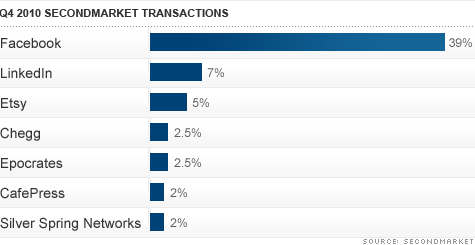SecondMarket trading doubles in private company stock
 By Julianne Pepitone, staff reporter January 22, 2011: 9:43 AM ET
By Julianne Pepitone, staff reporter January 22, 2011: 9:43 AM ET
NEW YORK (CNNMoney) — Investors spent $158 million snapping up shares of privately held companies like Facebook on SecondMarket’s platform last quarter — twice the volume the exchange had just one quarter earlier.
Facebook got the lion’s share of attention, accounting for 39% of the transactions SecondMarket completed in the quarter ended Dec. 31. A SecondMarket spokeswoman declined to comment on the dollar volume of the exchange’s Facebook stock sales.
Business social network LinkedIn came in a distant second, representing 7% of SecondMarket’s transactions during the quarter. Handmade goods marketplace Etsy comprised 5%, with other companies including CafePress making up the remaining chunk of deals.
Few tech companies have gone public in recent years. That leaves employees and early investors holding stock that’s essentially illiquid, unless they can arrange a private sale to an interested buyer. SecondMarket launched its private company stock marketplace in April 2009 to facilitate those deals. (Rival SharesPost is the other major exchange.)
The number of SecondMarket participants is growing rapidly and now totals 35,000. Buyers are typically venture capital funds or wealthy individuals, and most sellers are former employees.
But both the government and the companies involved are becoming anxious about the shadow market’s rapid growth. In October, Facebook and Zynga each began levying fees on employees trying to trade their stock.
That’s because losing employee shares to outsiders can be a nightmare for startup companies. Transferring private stock often comes with steep legal and administrative costs, and it can be tough for management to maintain control when a bunch of outsiders are shareholders.
And when the number of shareholders grows too large, the government gets involved. The Securities and Exchange Commission generally requires companies with more than 499 shareholders to disclose financial details that many companies would rather keep private until they file for an IPO. (That rule prodded Google (GOOG, Fortune 500), which gave stock options to many employees, into filing for its IPO in 2004.)
Highest in demand: Which companies are SecondMarket’s clients clamoring to buy into? Their top 10 list, in order: Facebook, Twitter, LinkedIn, Zynga, Craigslist, Groupon, Yelp, Digg, Kayak and SecondMarket itself.
But many of those companies don’t appear high on the completed transaction list, despite buy-side appetite.
In some cases, that’s because there’s no sellers. Another obstacle: Nearly all private companies retain the “right of first refusal” over deals and can opt to instead to buy the shares back themselves.
SharesPost founder Greg Brogger estimates that 90% of the transactions initiated on his platform are subject to first-refusal rights — and he said they’re often invoked.
“Facebook is good example. The company has for the most part been assigning its right to third parties,” he told CNNMoney recently.
That arrangement lets existing investors — like Digital Sky Technologies, a Russian investment group that owns a chunk of Facebook — step in to expand their holdings, buying shares that might otherwise go to a brand-new outside investor. ![]()
Tags: facebook, private equity, private markets, second market
 Oxstones Investment Club™
Oxstones Investment Club™